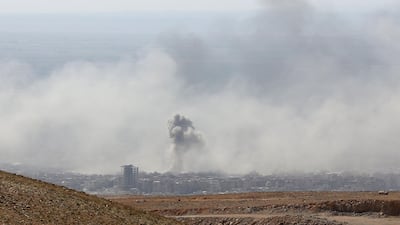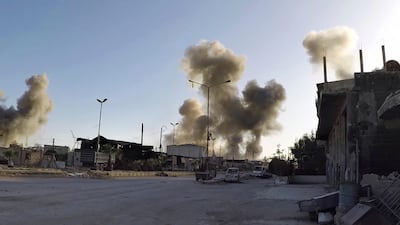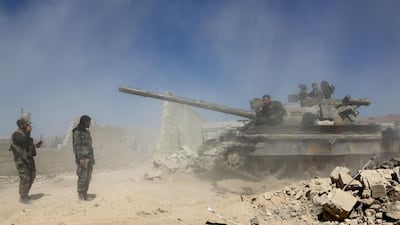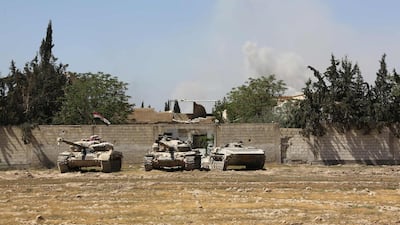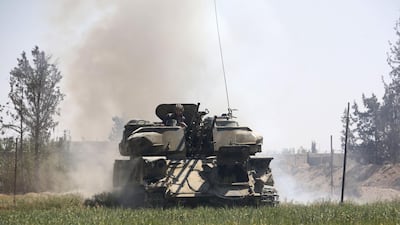Syrian media reported early on Monday that missile strikes were targeting the T-4 military airport in Homs. Pro-government media said the US was responsible but the Pentagon denied any part. Meanwhile, the White House held a high-level meeting to discuss its response to a reported gas attack on Douma on Saturday.
Syria's official TV reported on Monday at 3.30am local time that the T-4 military airport in Homs was under attack by missiles that it claimed were American. It said that air defences responded to the attack:
The US defence department denied carrying such an attack:
Residents of Lebanon heard the sound of what they thought were military jets passing overhead at around 3.20am:
In Washington, hours after President Donald Trump tweeted that Syrian President Bashar Assad will pay "a big price" for the chemical weapons attack in Douma, the White House was reported to be meeting late on Sunday to assess the evidence presented and discuss options including military strikes.
The alleged gas attack northeast of Damascus on Saturday night which killed at least 48 people and injured hundreds, according to rescuers, was the subject of much debate in Washington on Sunday. The White House called for a meeting at the mot senior level and was expected to be attended by the new national security adviser John Bolton. This will be Mr Bolton's first meeting in the job, and he is known for his hawkish views on Syria.
The government has also moved swiftly in coordinating possible responses with regional and European partners. The US Ambassador to the United Nations, Nikki Haley, along with the representatives of the UK, France, Kuwait and four other nations, called for an emergency meeting at the security council on Monday to discuss the reported attack:
In Washington, Mr Trump fired off a series of tweets on Sunday morning holding Russia and Iran responsible “for backing Animal Assad”, then stayed in the White House to review the US options.
Mr Trump also called Iraqi Prime Minister Haider Al Abadi, with whom he discussed – among other issues – the situation in Syria. Earlier in the day, White House homeland security adviser Tom Bossert told ABC that all options remained open. “I wouldn’t take anything off the table. These are horrible photos. We’re looking into the attack at this point,” he said.
Charles Lister, a senior fellow and director of extremism and counterterrorism at the Middle East Institute, told The National that the White House meeting will review range of options in Syria including military.
_______________
Read more:
Trump warns of 'big price' after Syria chemical attack
_______________
“The White House principals meeting is to be presented with a broad array of possible strike options, most likely those related to critical Syrian military infrastructure, facilities linked to the use of air, ground and missile bombardment and the construction of munitions and possibly also facilities suspected to be linked to the regime’s renewed chemical weapons research programme,” he said.
Mr Bolton’s attendance will bring in “a hard stance on Damascus, but he’ll have to balance a hesitancy within US Central Command”, Mr Lister said. Centcom’s reservations are driven by fears that US military strikes on Syria could endanger the 2,000 American troops in the country's north-east.
Meanwhile, Senator John McCain, a long-term critic of the president, blamed Mr Trump’s talk last week of withdrawing US troops from Syria, for emboldening Mr Assad, and urged a response to what he called the brutality:
But the debate about the withdrawal is to be distinguished from US policy and red lines against use of chemical weapons, said Mr Lister. “It is a very separate component of US policy on Syria – on reinforcing the norm against the use of weapons of mass destruction, and a tacit agreement was reached between the US, UK, France and others to respond to a ‘mass casualty’ event."
While Mr Lister said a non-military response is also an option including “a focus on intensifying targeted sanctions and reinforcing diplomatic pressure through other means”, other experts saw a higher likelihood of military strikes.
Nicholas Heras of the Centre for New American Security, said “the Trump administration has boxed itself into a corner” following the president’s tweets that there would be consequences for the Douma gas attack.
The Douma reports come a year after US hit the Shayrat airbase in Syria to punish the Assad government for another chemical weapons in Khan Sheikhoun and enforce deterrence.
"Mr Trump prides himself on living up to his promises. The challenge is that the attack on the Shayrat base last year was supposed to end Assad regime gas attacks. That has not happened," Mr Heras told The National.
As far as Mr Trump’s options are concerned, if the attack was verified and enough evidence was collected, most of them are military, said Mr Heras.
The US government “needs to act more forcefully than last year, which means striking a wider range of regime targets, especially in Damascus,” he said.
That could “incite Russia and Iran to strike US forces in Syria, making Mr Trump’s challenge to put Assad in a world of pain, without getting into a world war in Syria” the expert argued.
